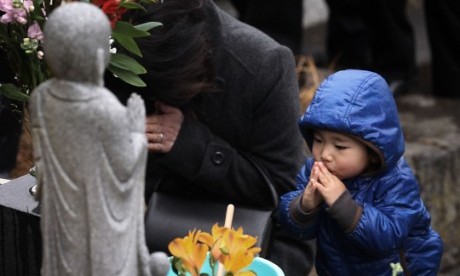The huge earthquake that struck northeast Japan on March 11, 2011 tested a nation and its faith. On this first anniversary we pause to remember that day, with prayer and reflection on what it means. Without warning, on a cold sunny day, an entire region was shaken by one of five most powerful earthquakes ever recorded; then the unimaginable power of a tsunami swept away everything in its path. The prolonged horror of the Fukushima nuclear disaster closed off vast areas and called reliance on nuclear power into question. 3/11 rammed home messages about human vulnerability.
As we witnessed a disaster in video after video, shattering photos, and maps that put us on the spot, the first impressions were of chaos. Dark thoughts centered on the natural force that can destroy without warning or recourse. Threats of nuclear catastrophe sparked rumors that Japan’s revered emperor had been secretly moved far from Tokyo, economic collapse seemed imminent, and political systems were jolted. Some called the events a punishment for a materialistic life, wages of sin. Visiting Japan a month later, I felt the somber mood and the eerie quiet of empty hotels and airports, and of streets where the few pedestrians walked with bowed shoulders.
But Japan has in the ensuing year won the world’s admiration. Its response to catastrophe set new standards for courage, solidarity, compassion, and diligence. Cleaning and rebuilding began even as people mourned the dead and searched for thousands who never returned. Families and communities supported each other. Support poured in and it was used, and used well. Japan is testimony that life goes on, that there is hope even in the darkest hours. A Japanese tradition likens this tough endurance and core strength to wheat: wheat sprouts in cold, harsh winters, is trampled on, but with deep roots in the ground resists cold and wind and grows straight into productive and beautiful plants.
Japanese religion today defies simple descriptions and it is often ignored. Some 70 percent of Japanese say they belong to no religion. But after 3/11 the spiritual beliefs that are deeply embedded in Japanese culture came into play. The religious response to the 3/11 catastrophe is an important part of the story of recovery. Read more
Sources
- Katherine Marshall in The Huffington Post
- Image: CBS News
News category: Features.




